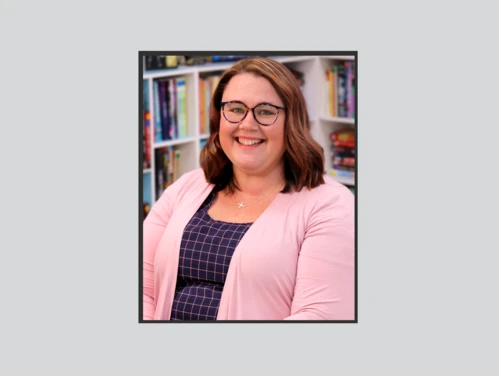During her year as the 2025 National Teacher of the Year, Pennsylvania teacher Ashlie Crosson is visiting with educators all across the country, sharing her experiences, best practices and philosophies on teaching in today’s world. Her upcoming stop in Iowa will be on Jan. 10 at the 2026 Emerging Educators Academy in Des Moines.
Crosson, an English teacher at Mifflin County High School, will be featured as the keynote speaker for the academy, which supports and celebrates new and preservice teachers and teacher mentors in Iowa. As an educator who strives to create learning experiences that resonate with students, foster empathy and build critical thinking, Crosson will provide attendees with valuable insight and encouragement as they move forward in the field.
Now in its 11th year, the Emerging Educators Academy is held annually to support new teachers in Iowa and provide connections to resources and experts in the teaching field. This year’s full-day event will be held at Drake University’s Olmsted Center in Des Moines, and new educators are invited to register by Dec. 19.
As a warm-up to the academy in January, the Iowa Department of Education asked Crosson some questions about her approach to teaching and how she successfully engages students.
We’re excited for your keynote address at the 2026 Emerging Educators Academy, which offers best practices, collaboration and support to new teachers in Iowa. As the Pennsylvania Teacher of the Year and 2025 National Teacher of Year, what are some keys to success for new and preservice teachers who are just getting started in the field?
Teaching is an inherently high-stakes, high-visibility profession. In such an environment, it’s easy to think you have to be a perfectionist to be successful. But at the end of the day, you are human and so are your students, and everyone deserves some grace. Demonstrating compassion for yourself, establishing a healthy work-life balance and seeking help when you need it are skills you want your learners to embrace. Modeling them directly is as valuable for you as it is for them. By engaging students, you can open doors to learning, exploration and development.
What is your approach to student engagement in your classes?
Centering learners’ participation and agency within our classroom activities and course objectives helps to make student engagement more of a daily norm than a daily goal. I use a lot of the pedagogical approaches we talk about in education all the time, things like project- and process-based learning, collaboration, multidisciplinary tasks, career-readiness connections, experiential learning and so forth to help ensure that what we’re doing in English class is interesting and relevant to students. Figuring out how to get those components to work in tandem with one another and with my content standards is a constant puzzle, but the energy in our classroom when all the pieces come together keeps convincing me it’s worth the challenge.
Serving as the advisor for the school newspaper and district magazine, you can help students apply classroom instruction to real-world skills and opportunities. Why is this important?
Ultimately, we want students to leave their schooling feeling competent and confident in the skills and knowledge they’re going to need to find happiness and stability in their adult lives. The more intentional we are about building those connections with them--whether it’s through portfolios or work-study partnerships or college essay workshops or cultural field trip opportunities--all of it is time well-spent in education. Helping students connect the dots between their passions and skills and how those things can translate into a meaningful paycheck is good for kids’ immediate engagement in school, good for their future success and ultimately good for the growth and prosperity of our communities.
As a first-generation college student, you’ve noted how important your teachers were for your success. How can teachers support today’s students and help them prepare for lifelong success?
There isn’t a singular answer to this question, and I feel like knowing that is essential to our ability to best support students. My teachers helped me in so many different ways. Some were particularly perceptive and recognized when I needed extra help in my personal life, some were so passionate about their content area that I fell in love with subjects I once dreaded and some had such high standards they made me work harder than I thought I could. It was my teachers’ authenticity--which collectively created a dynamic school experience—that gave me the skills and self-assurance I needed to pursue my goals. Understanding that how you best help one student will likely be different than how you best help another AND that you are part of a whole community of helpers makes the daunting task of preparing young people for the future world much less mystifying and intimidating. Education is a collective pursuit; building a strong, multi-faceted school community optimizes teachers’ efforts and creates the conditions for students to feel safe, supported and successful.
For more information on the upcoming Emerging Educators Academy, contact 2025 Iowa Teacher of the Year and event co-chair Melanie Bloom at melanie.bloom@iowa.gov.
